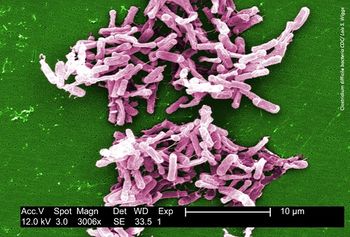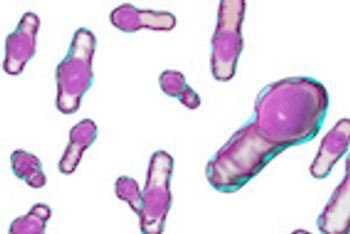
C. Difficile
Latest News
Latest Videos

CME Content
More News

A study found that patients with complicated C diff infections were more likely to have been previously hospitalized with numerically less time between hospitalization and recent C diff episode.

The authors of a new study say the use of antibiotics and proton pump inhibitors are among the list of risk factors for recurring C diff infections.

A new review recommends updated guidelines for diagnosing and managing Candida and C diff coinfection.

Vanessa Stevens, PhD, discusses her research on fluoroquinolone and cephalosporin prescribing and rates of Clostridium difficile infections at VA health care facilities.

Investigators from the University of Sherbrooke found some bacterial strains of C diff are likely associated with mortality in C diff infection, specifically, NAP1/BI/R027.

Contagion® caught up with Christian Lillis, executive director of the Peggy Lillis Foundation, to hear about the organization’s recent efforts, what obstacles it’s facing, and how providers can help.

The study found that that acute care hospitals with a 20% reduction in fluoroquinolone or third and fourth generation cephalosporins had a “corresponding decrease” in hospital-onset C diff.

Clostridium difficile rates in stem cell transplant patients are approximately 9 times greater than in hospitalized patients, with rates about twice as high in allogeneic vs autologous transplants.

The US Food and Drug Administration has granted Breakthrough Therapy Designation to investigational drug CP101 for the treatment of patients with recurrent C diff infection.

The long-term health care burden after Clostridium difficile (C diff) infection (CDI) is great for elderly patients. But even nonelderly patients are at risk for gastrointestinal symptoms for up to 2 years afterward.

FDA has granted Fast Track designation for ACX-362E, an investigational new treatment for C diff that is being developed by Acurx Pharmaceuticals, LLC.

To explore the long-term outcomes of treatment for recurrent C diff, NIAID has launched a new trial that will follow patients for 4 years to assess the safety of fecal microbiota transplants.

Clostridium difficile (C diff) infection rates remained relatively stable in 2015 and 2011 even though the rate of health care-associated infections was lower, respectively, according to recent findings.

In a new study, researchers with the US Department of Veterans Affairs found that metronidazole is as effective as vancomycin for treating mild cases of Clostridium difficile infection, despite new guidelines no longer recommending metronidazole.

A novel study from Seddon and colleagues adds to the body of evidence that supports what antimicrobial stewardship programs are so often challenged to do, early de-escalation.

Nicola Petrosillo, MD, discusses current controversies in C difficile prevention and treatment.

Norman Javitt, MD, PhD, discusses the concept of using ursodeoxycholic acid and its potential role in suppressing C diff spores to prevent inflammation.

Sahil Khanna, MBBS, MS, discusses the efficacy of fecal transplants and new investigational candidates that are being evaluated in clinical trials.

Maureen Spencer, RN, M.Ed., discusses how rapid molecular diagnostics are changing the treatment timeline for sepsis and Clostridium difficile (C diff).

Glenn Tillotson, PhD discusses the development of new antibiotics and therapies for C diff during an era when antibiotic resistance is a serious global health threat.

Clostridium difficile infection leads to higher rates of overall mortality among patients with cirrhosis compared to those who do not, according to a new study.

Edmund A. Hooker, MD, DrPH, discussed the gaps in disinfection in the hospital and how hospital beds can be properly sanitized to prevent the spread healthcare-associatedted infections.

C diff and pneumonia still pose significant threats, according to the hospital survey.

Key considerations when choosing a treatment for gram-negative nosocomial infections include the patient’s referring facility.

A new report from the CDC shows substantial progress on the incidence of health care-associated infections in the United States, but there is still more work to be done.









































































































































